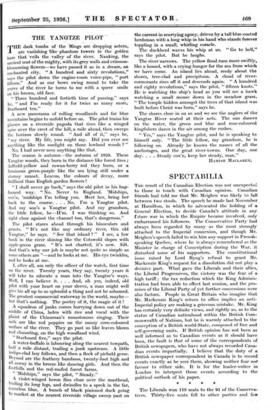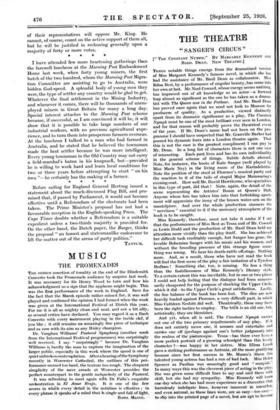SPECTABILIA
Tim result of the Canadian Election was not unexpected to those in touch with Canadian opinion. Canadian friends had told me that Mr. Meighen was likely to fall between two stools. The speech he made last November at Hamilton, in which he advocated the holding of a General Election, to decide Canada's attitude in any fature war in which the Empire became involved, only embarrassed his followers. The Conservative Party had always been regarded by many as the most strongly attached to the Imperial connexion, and though Mr. Meighen's speech failed to win him any support in Frenoh- speaking Quebec, where he is always remembered as the Minister in charge of Conscription during the War, it disturbed some of his supporters. The constitutional issue raised by Lord Byng's refusal to grant Mr. Mackenzie King's request for a dissolution did not play a decisive part. What gave the Liberals and their allies, the Liberal Progressives, the victory was the fear of a high tariff ; the tax reduction which the King Adminis- tration had been able to effect last session, and the pro- mises of the Liberal Party of yet further concessions were also factors. People in Great Britain who imagine that Mr. Mackenzie King's return to office implies an anti- Imperial policy are making a grievous mistake. Mr. King has certainly very definite views, and rightly so, as to the status of Canadian nationhood within the British Com- monwealth of Nations, but he is warmly attached to the conception of a British world-State, composed of free and self-governing units. If British opinion has not been as well informed as to Canadian events as it should have been, the fault is that of some of the correspondents of British newspapers, who have not always recorded Cana- dian events impartially. I believe that the duty of a British newspaper correspondent in Canada is to record events exactly as he sees them, showing neither fear nor favour to either side. It is for the leader-writer in London to interpret those events according to the political outlook of his paper.
The Liberals won 119 seats to the 91 of the Conserva- tives. Thirty-five seats fell to other parties and few of their representatives will oppose Mr. King. He cannot, of course, count on the active support of them all, but he will be justified in reckoning generally upon a majority of forty or more votes.
I have attended few more heartening gatherings than the farewell luncheon at the Morning Post Embankment Home last week, when forty young miners, the first batch of the two hundred, whom the Morning Post Migra- tion Committee are assisting to go to Australia, were bidden God-speed. A splendid body of young men they were, the type of settler any country would be glad to get. Whatever the final settlement in the Mining Industry, and whenever it comes, there will be thousands of unem- ployed miners in Great Britain for many a long day. Special interest attaches to the Morning Post scheme because, if successful, as I am convinced it will be, it will show that it is possible to take large numbers of our industrial workers, with no previous agricultural expe- rience, and to turn them into prosperous farmers overseas. At the luncheon I talked to a man who had farmed in Australia, and he stated that he believed the townsman made the best settler because he was more intelligent. Every young townsman in the Old Country may not carry a field-marshal's baton in his knapsack, but—provided he is willing to work hard and learn local conditions for two or three years before attempting to start "on his own "—he certainly has the making of a farmer.
Before sailing for England General Hertzog issued a statement about the much-discussed Flag Bill, and pro- mised that, if passed by Parliament, it would not become effective until a Referendum of the electorate had been taken. The Prime Minister's proposal has not had a favourable reception in the English-speaking Press. The Cape Times doubts whether a Referendum is a suitable expedient unless a two-thirds majority is provided for. On the other hand, the Dutch paper, the Burger, thinks the proposal "an honest and statesmanlike endeavour to lift the matter out of the arena of party politics." TANTUM.















































 Previous page
Previous page